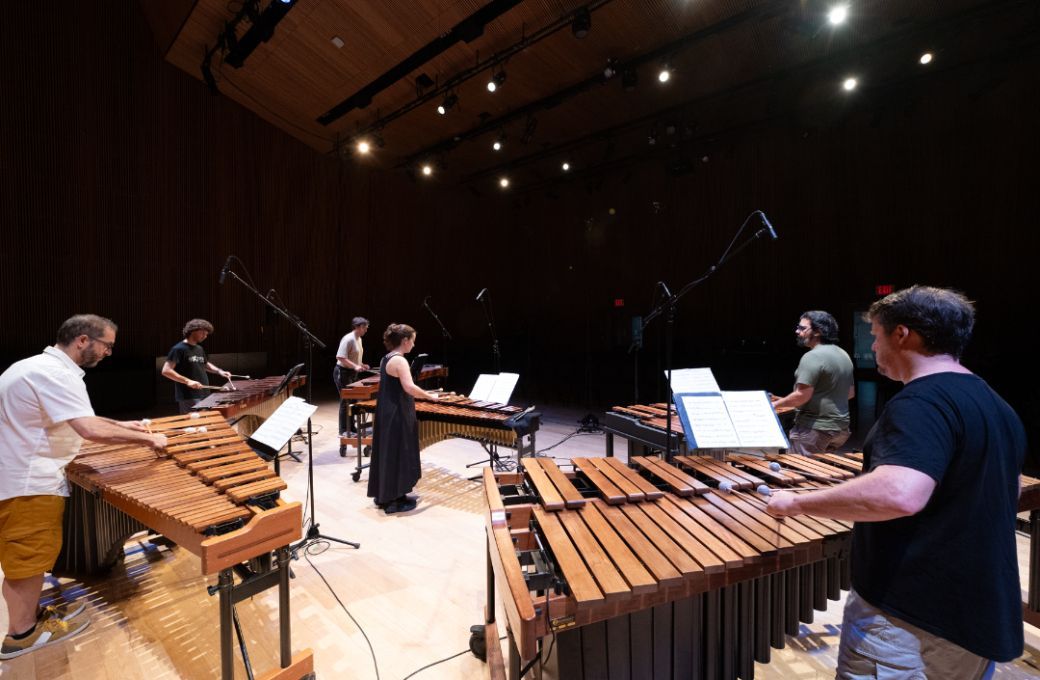Montreal’s Sixtrum Percussion made their way to New York City for a pair of concerts at the Time:Spans festival, a late summer gem on the annual NYC calendar. Their first appearance was a wild array of invention, the front of the room filled with hardware and bowls of water. The second, on Saturday, stood in stark contrast, framed by two very prominent and very different composers but just as much by the big wooden instruments that filled the staging ground. The program of Canadian and American composers was pristine both In sight and sound.

The evening opened with a 2006 Jennifer Higdon work for, in a sense, three four-hand marimbas. A Pulitzer winner and three-time Grammy winner, Higdon has described her composing as “intuitive” and inspired by the pop and folk music of her youth. Splendid Wood was ebullient and melodic, as is her wont. With fast unison lines and pleasant accoutrements, it wasn't the contemporary challenge to mind and ear that Time:Spans usually presents. It did, however, make for an inviting introduction to the syntax of the evening.
The six members of Sixtrum then moved to the fall contingent of marimbas, arranged in two rows, for the metered dissonance of Éric Champagne’s Onde de choc (2020, revised in 2022). Tension was built faster than it could be released, and then rebuilt again, adding texture with brushes and bows. The marimba doesn't cede easily to preparations, though. You can put a rope swing on a tree but it's still a tree, and marimbas are going to sound like marimbas whatever the implements. Still, it was a good thrill ride.
Jordan Nobles’ brief but perfect Still Life followed. The ensemble left the two center instruments unattended making for a striking stereo field. Fast repetitions and gradual modulations instilled a tremolo trance then receding almost to a drone in about five minutes. Nobles composed the work for choir in 2006 but later revised it for marimba ensemble. It was the unexpected highlight of the evening.
Another short piece followed, a 1934 arrangement of shadow puppet theatre music by Colin McPhee entitled Balinese Ceremonial Music. The Montreal-born ethnomusicologist’s transcription was for two pianos; Sixtrum member Fabrice Marandola’s arrangement for the ensemble was playful and engaging, leading up to what was doubtlessly the main event.
Steve Reich’s Six Marimbas followed a similar trajectory into becoming as did McPhee’s Ceremonial Music. It began life in 1973 as Six Pianos and was transcribed for marimbas at the suggestion of a percussionist friend, and a good suggestion it was. Six Marimbas (1996) has become one of Reich’s more celebrated works, if for obvious reasons not one of his most performed. It rushes like the lifeblood of his New York City home, like our own shadow puppet soundtrack, busy and meticulous, a music for people practiced in the art of not running into one another. Watching Sixtrum perform it was like rush-hour seen from above; listening to it was hypnotic and delirious. The ensemble’s taut finesse wasn't in doubt through the preceding pieces, but here they (or we – or I) reveled in every shift, crossfade and reformulation, easily forgiving the occasional cluttering stick and losing any sense of time until the ensemble stopped on a dime. It was a stunning display, nestled in a basement somewhere in Hell’s Kitchen, of the rhythms of urban life.


